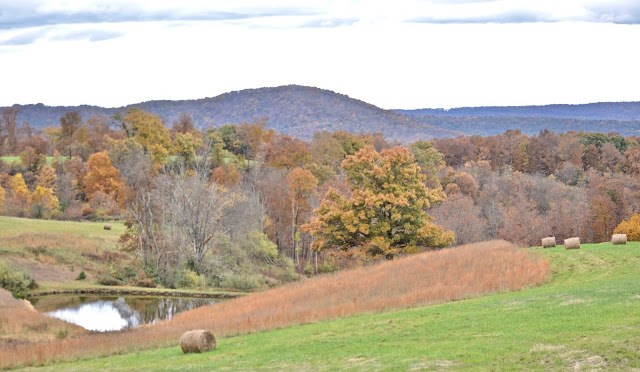The world seen through the windows of my study, even in the muted tones of autumn, abounds in natural beauty. And still, it's a world away from the rainforests and breath-stopping coastlines of Australia where we felt spirited away to a magical place.

But there, too, like the D.C. suburbs where we resided for many years, the streets outside our airport hotel in Sydney, convenient for the return flight, were of a different world, much more grey and noisy. In order to enter the beauty of nature and especially to commune there with the divine, we may need to realize the different realities or "worlds" around and within.

In Religion and the Order of Nature, Nasr contrasts a) the world that can be seen, loved, and nurtured as sacred with z) one targeted for pollution and destruction by humans driven by voracious intentions bent on feeding insatiable appetites. In addition to feeding sensory lust for material possession, the rapacious aggression can result also from a thirst for knowledge stripped of the sense of the sacred. “The environmental crisis requires not simply rhetoric or cosmetic solutions but a death and rebirth of modern man and his worldview.” Humans must be reborn to conceive of “a sacred realm reflecting the divine creative energies” (pp. 6-7).
It’s almost as if inhabitants of this globe are on different planets using the same words but ruled by hugely different worlds. Certain words reference a person’s dominant values such as “nature,” “money,” “sense,” and perhaps most importantly, “God.” And to boggle the mind, the same word can mean vastly different worlds. Each person serves a master of meaning whether it is his/her own self, a quest for knowledge, the Divine Source, or some other force.
A complication arises when the culture surrounding words and worlds pervades the individual so that meaningfulness can scarcely be found--unless consciousness develops and shifts . Nasr elaborates how the meaning of Nature has dramatically transformed so that the presence of God often goes missing due to the “scientific revolution” and the “death of God.” It can happen unless a person is “reborn” (as noted above). Without the reborn consciousness, persons in the “modern” world tend to treat nature (including plants, animals, and “othered” humans) as objects suitable for exploitation. The following passages detail the contrasting worlds and significant consequences.
“… among all the factors distinguishing one type of humanity from all others was the presence of the skeptical vein. It led to many scientific discoveries but also to the loss of sacred knowledge and in some cases the sense of the sacred itself. And it remains to this day a salient feature of that type of human being for whom the desecration of nature is meaningless because there is nothing sacred to start with. . . this type of naturalism involved more the rediscovery of pleasure than of the spiritual significance of the body or nature. . . There thus appeared this other important characteristic of modern man so prevalent to this day, that of being a prisoner of his senses, which he must seek constantly to satiate without limit, and that of a follower of a naturalism that is against the order of nature as a value in itself, a being devoted to the bodily gratification without the least interest in the significance of the body in the religious, metaphysical, and cosmological sense.” (p. 172)
The “rediscovery of pleasure” and the “bodily gratification” especially expresses itself in the “appreciation of the importance of money.”
“The modern world needs nothing more than the so-called world-denying mysticism that is nothing other than its ascetic aspect that seeks to control the passions and to slay the dragon within, without which the greed that drives the current destruction of nature cannot be controlled. Moreover, world-denial is simply one aspect of a single reality whose other dimension is ‘world-confirmation,’ but the soul cannot confirm the world as sacred without first of all denying the ‘world’ that disperses the soul from within and makes it ever more reliant upon the material environment for the satiation of an ever-increasing thirst. One wonders how, in the light of the crucial nature of the problem at hand, a deeper distinction is not made by often well-intentioned eco-theologians between the world as enticement toward passion, greed, and aggression and the world as God’s Creation and ultimately theophany.” pp. 217-18.




No comments:
Post a Comment